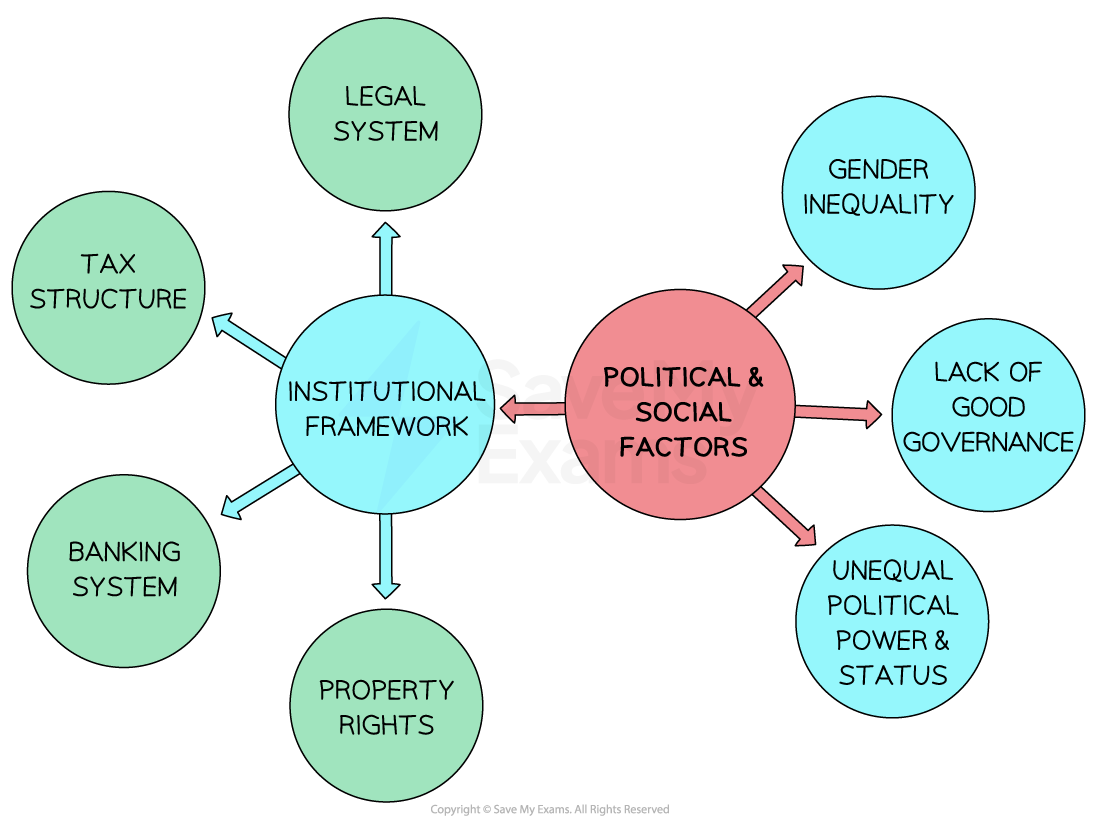Types of Economic Barriers
Economic Factors that Influence Growth & Development
Factor |
Explanation |
|
Dependency on the primary sector
|
|
|
Rising income inequality |
|
|
Lack of access to international markets |
|
|
Informal economy |
|
|
Capital flight |
|
|
Indebtedness |
|
|
Lack of access to infrastructure & appropriate technology |
|
|
Low levels of human capital |
|
|
Geography including landlocked countries |
|
|
Tropical climates and endemic diseases |
|
Types of Political & Social Barriers
- Aside from the economic factors discussed above, a range of non-economic factors can have significant influences on economic growth & development

Political & social factors which hinder growth & development
The institutional framework
- This refers to the functions of government including the legal system, law enforcement, banking, tax structures and property rights
|
Legal system |
|
|
Tax structure |
|
|
Banking system |
|
|
Property rights |
|
Lack of good governance
- Leads to inefficient use of resources & poor decision-making. It may also result in laws/regulation which directly inhibits growth & development
- Often money intended for investment is siphoned off by corrupt politicians resulting in a lower level of investment. Corruption also diverts funds to certain groups who have bribed or lobbied officials (e.g. multinational firms) resulting in projects that deliver a low level of growth & development
Unequal political power & status
- Countries with strong trade union membership provide workers with more power and higher levels of income
- With low trade union membership, the exploitation of workers through low wages is easier and income inequality is worse
- Countries with a class system are less incentivised to increase economic growth and development in such a way that it removes the class barriers. This limits growth and development
Gender inequality
- Gender, race or any other discrimination increases income inequality in an economy leading to lower levels of economic growth
- Gender inequality reduces the incentive for women to work and this can mean a loss of productivity to an economy, leading to lower economic growth
Evaluating Barriers to Growth & Development
- There are a common set of factors which prohibit economic growth and development, however, each country is unique and is likely to have a different combination of factors which are more prominent
- Understanding the context of the country is vital to evaluating how significant the barrier to economic growth is
- E.g. Romania has a history of corruption which has reduced its development significantly when compared to other Eastern European countries
- E.g. India has had infrastructure problems (old rail systems and poor roads) which have limited its ability to grow. To address this weakness, significant government investment has been taking place over the past 10 years and the economy is responding well
- E.g. Malawi is a landlocked country whose exports are primarily agricultural. Agriculture accounts for 30% of its GDP and the cost of export is higher for a landlocked country. This reduces profits and limits economic growth.
Exam Tip
The data response in paper will frequently have extracts which paint a picture of a developing economy. As you read through the data, think about the economic, political and social barriers to development and growth and seek to identify which ones seem to be most prominent in the extracts presented. Reading with this focus helps you to evaluate the context as you assimilate the information and puts you in a better position to answer the questions which follow.